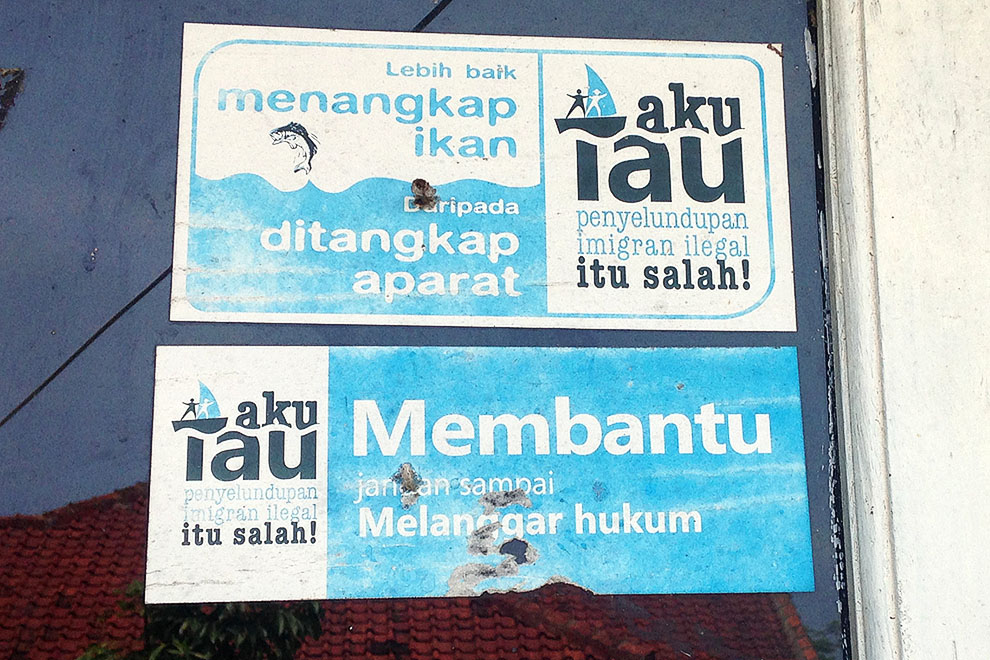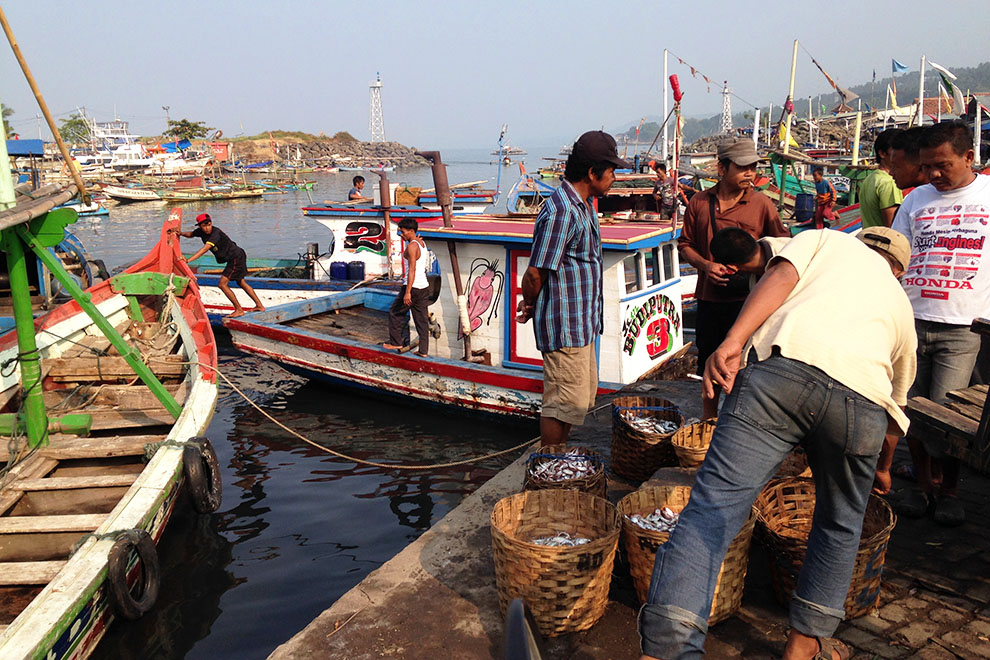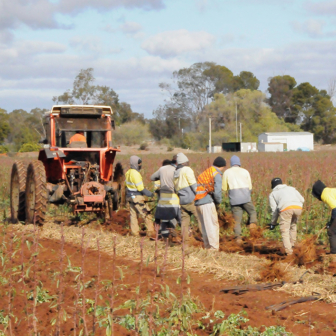For the past fifteen years, Australia has funded information campaigns designed to deter asylum seekers from reaching Australian shores. In countries of origin and at transit points, films, billboards and TV commercials have warned asylum seekers of everything from the dangers of crocodiles and sharks in the hostile Australian environment to the risks of the voyage at sea. Recent campaigns have also emphasised that those who make the journey will never be resettled here.
Since 2009, these campaigns have been given a slightly different twist in Indonesia. Rather than targeting asylum seekers directly, they are pitched at potential crew members on asylum-seeker vessels. Fishermen from poor coastal areas are frequently recruited by middlemen for boats carrying asylum seekers to Australian territory. As small-fry in the smuggling trade, they are offered a relatively large amount of money for a few days’ work – enough to clear outstanding debts or to supplement their regular incomes, which are rarely sufficient to live on. If they’re caught, however, they risk being prosecuted as people smugglers under Australian and Indonesian law. In both countries the minimum sentence for people smuggling is five years’ jail.
People smuggling, defined very broadly, became a criminal offence in Indonesia in May 2011. The definition includes such things as providing accommodation or transport within Indonesia to people without a visa. To bolster enforcement, the Indonesian Anti–People Smuggling Taskforce, with fourteen local chapters across the archipelago, receives generous funding from Australia. From 2012 to 2013, Indonesian police made 219 arrests on suspicion of people smuggling (199 Indonesians and twenty foreigners). Arrests continued at a lower level in 2014, the year Indonesia suspended bilateral cooperation on anti–people smuggling measures following the spying scandal in November 2013. Although the number of boats departing for Australia has dropped since the introduction of the Abbott government’s Operation Sovereign Borders, the arrests continue. Among them are crew members of at least twelve vessels that have been returned to Indonesia.
In Oelaba, a village of around 7000 people on the island of Rote, more than fifty locals have spent time in Australian jails for people-smuggling offences. Four local youngsters have disappeared without a trace and may well have died at sea alongside their passengers. Oelaba was one of the villages targeted via public information campaigns in a pilot phase in 2009–10. In this village, as elsewhere, workshops were held with local police, and religious and community leaders to gain their “buy-in” to the campaign message: “I know people smuggling is wrong.” Printed on stickers, banners, mugs and t-shirts, the message was delivered at larger community events, combined with family activities, competitions, quizzes, prizes and films.
According to the agency funded by Australia to design and implement the campaigns, the International Organization for Migration, or IOM, the material has been resoundingly successful. The IOM claims to have reached tens of thousands of people in fishing communities across the Indonesian archipelago and to have achieved “a radical shift in public opinion regarding the social and economic impact of people smuggling.” In the target communities, people are said to have moved from “general acceptance/tolerance or ignorance” to “virtually unanimous rejection of people smuggling.” After the initial Indonesian pilot, Australian Customs and Border Protection invested a further $5 million in a second phase of the campaign to run to the end of 2014.
The IOM developed the campaign in close coordination with the Indonesian Directorate General of Immigration and the Indonesian National Police. It used market research, conducted by a Jakarta-based firm, which recommended a more “positive” and “values based” approach, linked both to the influence of local authority figures and to villagers’ sense of identity and self-worth. In this respect the campaign messages are seen as an advance on the negative messaging directed at asylum seekers in source countries.
We recently visited communities in West Java and Rote Island in Eastern Indonesia, where small numbers of fishermen were serving sentences for people-smuggling offences committed in the last twelve to eighteen months. What we saw in villages and jails suggests there are good reasons to question the Australian-funded campaigns.
One of the striking features of the material developed by the IOM is that it ignores the broader asylum-seeker issue. In fact, no mention is made of asylum seekers in the educational films screened at community events that purport to explain the background to the campaign message. The people in question are referred to instead as imigran gelap (illegal immigrants) by the Indonesian narrator and as “irregular migrants” in the English subtitles. Nor do the films discuss why these imigran gelap have come to Indonesia, what their circumstances might be, or why they might wish to reach Australia.
Instead, they focus on three core messages, developed by the market-research firm contracted by the IOM. The first message is that transporting imigran gelap constitutes people smuggling and is a criminal offence. The second message is that those who engage in people smuggling harm their reputation and negatively impact their self-esteem (harga diri). The films introduce Indonesian fishermen who have served time in Australian prisons for smuggling offences; they explain why they regret their actions in an effort to convince the audience that it is better to be a poor but honest fisherman than to profit through crime and end up in jail. The third message is religious – that people smuggling is a sin (dosa).
In order to give weight to the religious dimension of the message, one of the films includes a Christian pastor and a Muslim cleric having their say. Not only is people smuggling identified as sinful, but so too is any other assistance provided to imigran gelap, including accommodation, transport, information or other forms of help. “From a religious perspective,” says the Christian pastor at one point, “it is strictly forbidden to provide assistance or help to those who make journeys without complete documents, those who are also referred to as illegal immigrants… If we provide assistance, we ourselves will be damaged.”

“I know people smuggling is wrong”: Campaign material in Pelabuhan Ratu in West Java. Anne McNevin
As well as the films, special sermon booklets (buku khotbah) have been produced for both Christian and Muslim audiences. The sermons use biblical analogies and Koranic verses to explain why people smuggling is sinful. The authority and influence of religious leaders over local communities has been harnessed by the IOM to ensure the sustainability of the message. When market researchers initially proposed the sermons, they provided samples for religious leaders to use or adapt. Excerpts from the proposed sermons were included in documents we gained access to under Freedom of Information laws. The sample Christian sermon explained why the parable of the Good Samaritan should not be interpreted as a justification for assisting imigran gelap. An excerpt from the sample Muslim sermon reads as follows:
The blessed people of Allah, many among you are fishermen and others who work in the coastal industry. There has been news circulating recently of many irregular migrants trying to reach Australia through our borders, through this area. The way they can reach Australia is by using our boats, our people, our knowledge. They ask for help but blessed people of Allah, I tell you that this is not the help that is talked about in the Al Qur’an. Bringing irregular migrants to Australia is illegal. And it is a sin. If you agree to help house irregular migrants before they leave for Australia, if you have anything to do with smuggling these irregular migrants to Australia, it is a sin. You are not helping them, you are doing something wrong in the eyes of Allah.
Using religion to convey political messages is not a new phenomenon in Indonesia.Religious networks are used to promote the state-driven family planning program “two children are enough” (dua anak cukup), for instance. Nevertheless, religion can be a volatile factor in Indonesian politics. Any attempt to cultivate religious messages for political objectives that originate outside Indonesia (in this case, Australia’s determination to deter asylum seekers) runs the risk of inciting sentiments that may well outrun the original intent of the message. There’s also a broader question: how happy will Australians (Christian, Muslim or otherwise) be to learn that religious messages are constructed and deployed in this way as part of Australia’s border-policing activities? Recent statements of concern about asylum policies from Australian Anglican church leaders suggest that the Indonesian information campaigns may warrant more debate than they have prompted so far.
Whatever the moral rights and wrongs of assisting asylum seekers, a fisherman’s decision to crew a boat en route to Australia is likely to be determined more by economic than by religious concerns. By any measure, fishing communities struggle to maintain livelihoods. As nearby reefs decline from over-fishing and environmental damage, deeper-sea fishing expeditions – which are costly in fuel, food, equipment and time – are often beyond the means of ordinary villagers. Many fishermen accumulate debts to boat owners that can’t be repaid after disappointing catches. In an attempt to break a cycle of debt, they often abandon their trade, and fishing boats lie unused and deteriorating. Some have turned to seagrass farming as an alternative, and modest local government schemes exist to encourage this fledgling industry. But the income is modest at best and rarely enough to make ends meet. The sum promised for crewing a boat (from A$2000 to A$3500), by contrast, is enough to break the cycle of poverty.
The religious messages in the anti-smuggling campaign ignore these structural and developmental factors in favour of a stress on individual moral fibre. For fishing families, the question of whether people smuggling is illegal, sinful or destructive of self-worth will always be secondary to more immediate concerns about putting food on the table. And those who understandably prioritise basic necessities may well be duped into dangerous schemes by organisers and middlemen who remain distant from the risks of the boat trip and the law.
Once the small fry are caught, however, the religious messages only serve to compound their anguish and humiliation. In the short term, these campaigns may alert vulnerable fishing communities to the risks, but by obscuring the larger issues they are unlikely to assist those communities to fully inform themselves about what is happening, why they are at risk, and what can be done in the longer term to generate viable alternatives for everyone concerned.
Even the short-term goal of raising awareness of risks comes with complications. Two West Javanese fishermen we spoke to had attended campaign events and were aware of the penalties for people smuggling, and both had encountered emergencies involving “immigrants” (as they called asylum seekers) at sea. They were aware that Australian authorities would intercept and destroy vessels found to be carrying these “immigrants” in or nearby Australian waters, and that the crew of those vessels could be perceived as smugglers. As a consequence, they were faced with an additional moral and economic dilemma.
As fishermen, they knew their own safety was tied to the maritime culture of rescue at sea; at any point in the future it could be their own vessel in distress. Yet they could not risk the destruction of their fishing boats – which they didn’t own and couldn’t afford to pay for – if Australian authorities intercepted them with rescued people on board. No matter how close to Australian territory they might be, their only option, as they saw it, would be to return rescued “immigrants” to Indonesia. But the costs involved, including extra fuel and the loss of several days’ work to police investigations, represent a genuine incentive not to rescue. The reality of this dilemma is supported by accounts from two asylum-seekers we interviewed who survived when their vessels sunk at sea (one having spent three days in the water) and reported that fishing boats had passed by without assisting.
This dilemma may be an unintended side effect of the campaigns directed at Indonesian fishermen in conjunction with the deterrence approach of Operation Sovereign Borders. But incentives to rescue were also jeopardised by the earlier refusal in 2001 to allow the MV Tampa to dock at Christmas Island. The legal disputes following the Tampa incident doubtless caused commercial operators, large and small, to reflect on what is at stake in rescuing asylum seekers at sea in Australia’s region. The contradiction with the humanitarian goal of saving lives at sea (voiced on both sides of parliament) is clear, and it will persist for as long as Australia’s policies and initiatives ignore economic and developmental pressures that shape our regional border-policing environment. •




